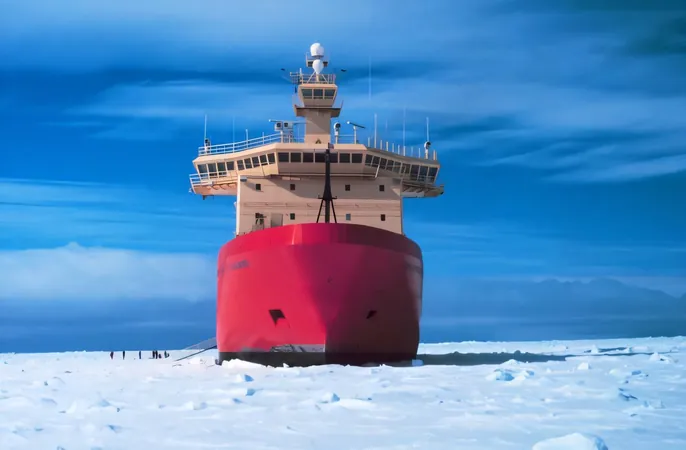
Urgent Call to Save the Only U.S. Antarctic Research Vessel: Is Science at Stake?
2025-09-12
Author: Daniel
A Crucial Letter from the Scientific Community
On July 28, a passionate group of 170 researchers took a bold stand, sending a compelling letter to the National Science Foundation (NSF) and Congress. Their mission? To protest the NSF's controversial 2026 budget plan, which proposes the termination of the lease for the Nathaniel B. Palmer, the sole U.S. research vessel operating in the icy expanse of the Southern Ocean.
The Nathaniel B. Palmer: An Icebreaker Like No Other
For over 30 years, the Nathaniel B. Palmer has played an indispensable role in advancing our understanding of Antarctic science. This icebreaker is uniquely equipped to venture through frozen waters, allowing for vital long-term research in otherwise inaccessible regions. Among the signatories of the letter are prominent scientists from institutions such as Columbia University, all uniting to defend the critical importance of this vessel for scientific exploration.
Why the Palmer is Indispensable for Antarctic Research
Dr. Robert F. Anderson, a leading chemical oceanography expert at the Lamont-Doherty Earth Observatory, emphasized the vessel's irreplaceable value. "To study sea ice, you absolutely need a ship,” he asserted. "Ground research just won't cut it. If we want to understand how ice shelves react to climate change, we need access to the ocean and the coastal areas, which only this ship can provide."
The Southern Ocean: A Carbon Sink in Question
The signatories’ concerns extend beyond just Antarctic exploration. The Southern Ocean is recognized as a vital region for the global carbon cycle, effectively absorbing more carbon dioxide than it emits — a critical feature for combating climate change. Recent NASA findings highlight the importance of further research in this area. Additionally, the Thwaites Glacier, known as the 'doomsday glacier' for its alarming rate of melting, has been extensively studied thanks to the Palmer’s efforts.
A Warning of Scientific Decline
Without the Nathaniel B. Palmer, Anderson warns that the U.S. risks losing its footing in global Antarctic research. Other nations like South Korea and China are ramping up their own efforts, while traditional leaders such as Britain, Germany, and Italy maintain a strong presence in Antarctic exploration. "If we lose this ship, we won't just be falling behind; we might be forfeiting U.S. leadership in scientific advancement and geopolitical influence," he cautioned.
A Call to Action: The Future of Antarctic Research
The researchers' letter concludes with a heartfelt plea, urging the NSF to reconsider its decision and to support the development of future research vessels instead. "Let’s not end a proud legacy of U.S. contributions to science," they implore. With the lease set to expire in October, the clock is ticking. As Anderson put it, losing the Palmer would be a monumental setback: "This vessel has been unmatched in its contributions. We would be ashamed to lose it."



 Brasil (PT)
Brasil (PT)
 Canada (EN)
Canada (EN)
 Chile (ES)
Chile (ES)
 Česko (CS)
Česko (CS)
 대한민국 (KO)
대한민국 (KO)
 España (ES)
España (ES)
 France (FR)
France (FR)
 Hong Kong (EN)
Hong Kong (EN)
 Italia (IT)
Italia (IT)
 日本 (JA)
日本 (JA)
 Magyarország (HU)
Magyarország (HU)
 Norge (NO)
Norge (NO)
 Polska (PL)
Polska (PL)
 Schweiz (DE)
Schweiz (DE)
 Singapore (EN)
Singapore (EN)
 Sverige (SV)
Sverige (SV)
 Suomi (FI)
Suomi (FI)
 Türkiye (TR)
Türkiye (TR)
 الإمارات العربية المتحدة (AR)
الإمارات العربية المتحدة (AR)